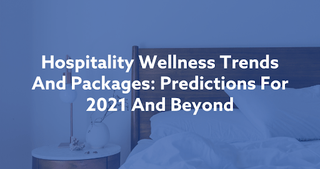Hospitality Wellness Trends and Packages
Date
30.06.21
Type
Articles
Category
Tools ,
Coronavirus

Predictions for 2021 and Beyond
This week, we’re delighted to chat with Pamela Carvell, Life President at HMA, about the latest hospitality wellness trends and packages as we edge out of lockdown.
As we edge further out of COVID-19 restrictions, many hotels and resorts across the country are getting ready for the summer spike.
With the help of our leisure-based booking engine, spa and leisure hotels nationwide can look to boost their conversion rates; a particularly useful tool for hotels located in the countryside.
In the post-lockdown period, hotel guests are flocking to the UK’s seaside towns to get their fix of sun, sea and sand. Whilst this is great news for coastal based hotels, those located in the country may not get so lucky.
We’ve spoken to Pamela Carvell, Life President of the Hotel Marketing Association, all about hospitality wellness trends and packages. Keep reading for exclusive insight into her predictions for 2022 and beyond:
Wellness Trends For 2021 and Beyond: Personalisation

Regardless of where your hotel is located, listening to your guests is, by far, one of the best ways to boost your conversions. When discussing behaviour patterns of hotel guests post-lockdown, Pamela said: “There is now a sector of people that want no-touch treatments because of everything we’ve been through over the past year.
Additionally, we can expect to see an increase in spa suites; personal treatment rooms located within hotel bedrooms, designed to avoid close contact with other hotel guests.
Having spent so much time outdoors, many guests are now looking for experiences that integrate mindfulness and meditation, such as outdoor yoga and pilates classes.
Hotels can achieve this kind of personalisation by asking their guests to complete pre-stay questionnaires; they could specify anything as broad as their favourite foods, right down to details such as the type of music they’d like in their therapy room!”
Pamela also discussed the benefits of designing a guest’s stay around their body clock; this could include booking treatments at a time that suits a guest’s natural rhythms.
Boosting Conversions For Spa and Leisure

With this in mind, hoteliers can use Profitroom’s automated guest messaging service to communicate with their guests pre-stay, specifying any details or preferences in advance of their stay.
Our advanced system also allows hotels to personalise their upselling opportunities - and in the case of spa and leisure facilities, hoteliers have the ability to attach pricing lists and spa treatment lists, before following up with reminders and tailored offers.
With all-new alert features, hoteliers can also use our booking engine to send more information about spa and leisure facilities to those who are interested.
Boringdon Hall, a leisure hotel in Plymouth, uses our booking engine to display their wide range of packages at the booking stage. Upon making a reservation, potential guests are presented with opportunities to upgrade their stay with spa, dining and seasonal bundles. Extensive information about each package is available right at their fingertips, without taking the user away from the page, with an easy-to-spot price list.
St Michael’s Resort, a leisure hotel in Falmouth, takes a similar approach to its booking process, displaying upgrade opportunities in thumbnail style. Using this format, potential guests are able to see prices, availability, special conditions and included offers without having to navigate away from the page.
The Booking Journey

Through the collection of guest data, leisure and spa hotels can also gather details about a potential customer’s booking journey - and retarget those that may have abandoned the cycle too early. Through the use of our booking engine, hotels can send personalised automation, as well as having the ability to segment their guests to specifically target those interested in spa and leisure experiences.
The Holistic Spa Experience

According to Pamela, hotels haven’t adapted their wellness offerings much, despite the consequences of the pandemic.
Despite this, Pamela said that she would like to see hotel spas, once again, put food and nutrition first. Rather than opting for the traditional afternoon tea or burger and chips, Pamela would like to see hotel guests educated about the benefits of eating a healthy balanced diet. Pamela said: “Gut health impacts mental health. Serotonin is made in the gut, which is the hormone that makes us happy. I would love to see hotels and spas embracing that knowledge.
A holistic approach must include healthy eating to have people feeling great. Hotels could also tailor guest experiences to different ages and lifestyles too, using pre-stay assessments to gather knowledge about each individual.”
More In-Room Service

With the effects of the pandemic in mind, it looks as though we’ll see an increase in in-room experiences: “We’ll see a broader base of in-room offerings in hotels. Now, it’s a basic room service menu. What we’ll start to see is more things being delivered and more hotels creating spa suites. Most people want to hug others, but some will be fearful and will want to spend more time in their room. This helps to accommodate different guest preferences.”
Getting Creative with Empty Spaces

During the pandemic, and perhaps even into the aftermath, many hotels have had a variety of empty spaces, largely due to the absence of meetings.
When discussing the innovative and creative ways hotels can use their empty spaces, Pamela said: “Some of the big chains have been saying that meetings and events will not succeed post-COVID now that Zoom has become so popular. Hotels will have lots of empty spaces - but they can be clever with them. They could create cosy, designated private lounges for guests to enjoy at their leisure, with a room service menu and great WiFi signal.”
Encouraging Wellness Amongst Hotel Employees

Of course, no hotel can meet the wellness needs of their guests if staff are not trained accordingly. Pamela spoke to us about one of her latest projects, which looks to enhance the mental and physical health of hotel employees.
Pamela’s training programme focuses on the following modules:
- Nutrition;
- Calmness and happiness;
- Managing fear, change and time;
- Great communications.
Pamela and her team created the programme pre-COVID and did so with the aim to enhance the mindfulness offerings that many hotels were beginning to offer their staff: “I’m relaunching this because I think there’s going to be a huge need where employees have been on Furlough for over a year and maybe nervous about being back with people again. People may also be worried about going to city centres. Rural hotels will be chock-a-block, and employees will suddenly be under a lot of pressure.”
Sustainable Wellness

We may be expecting increased awareness around personal health and wellbeing, but sustainability continues to be a hot topic - and should be something that all hoteliers keep in mind.
Hotels can make a huge difference by swapping plastic toiletries for biodegradable packaging and reducing energy consumption by cutting down on laundry (with the permission of the guest).
With all that in mind, hotels can expect to see an increase in demand for improvement and consideration in their approach to overall wellness, largely due to the health concerns that have arisen due to the COVID-19 pandemic.
From improved personalisation to staff wellness, we could expect to see a complete transformation in the spa and wellness industry. If you haven’t yet thought about how you can embrace wellness in anticipation of the summer spike, don’t hesitate to contact a member of our team for tips and advice.
Thank you to Pamela Carvell for collaborating with us on this article.



